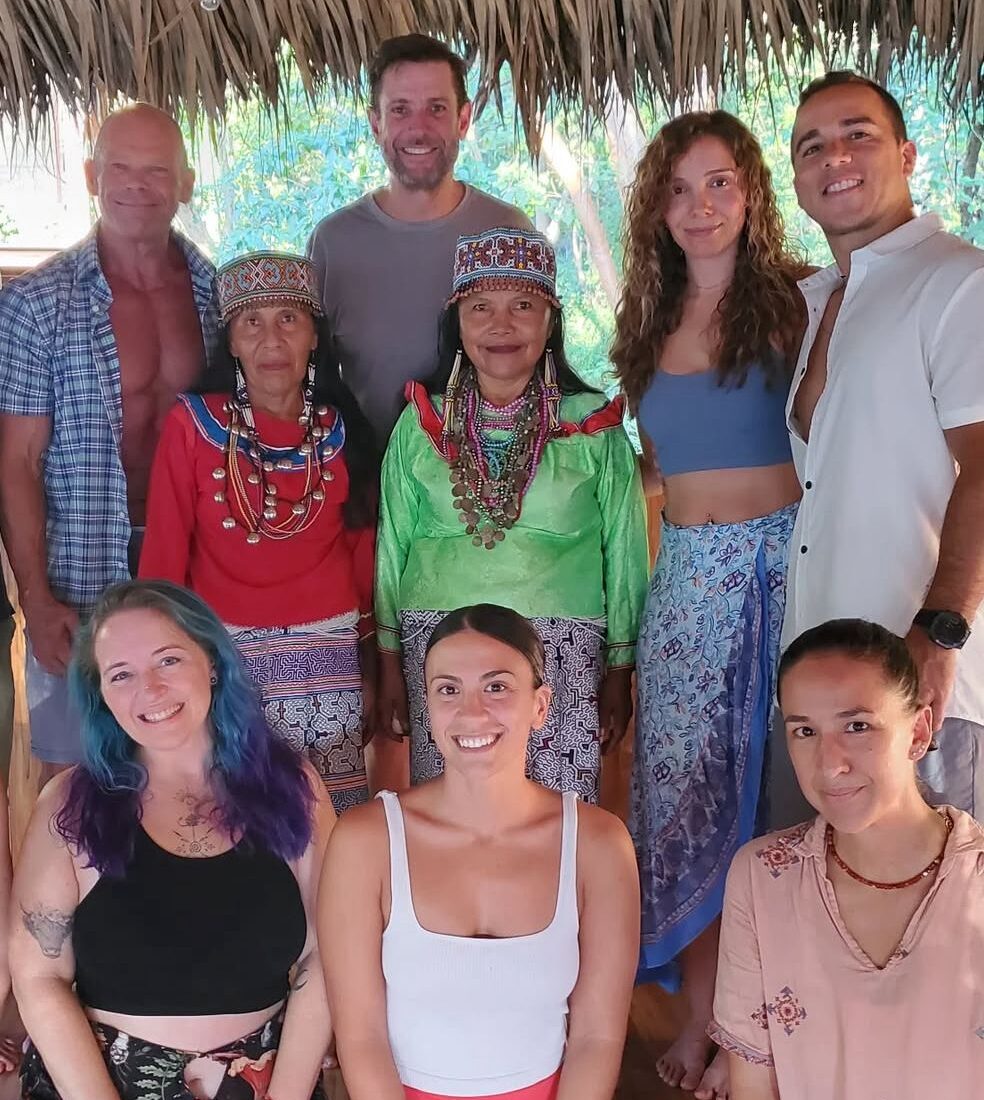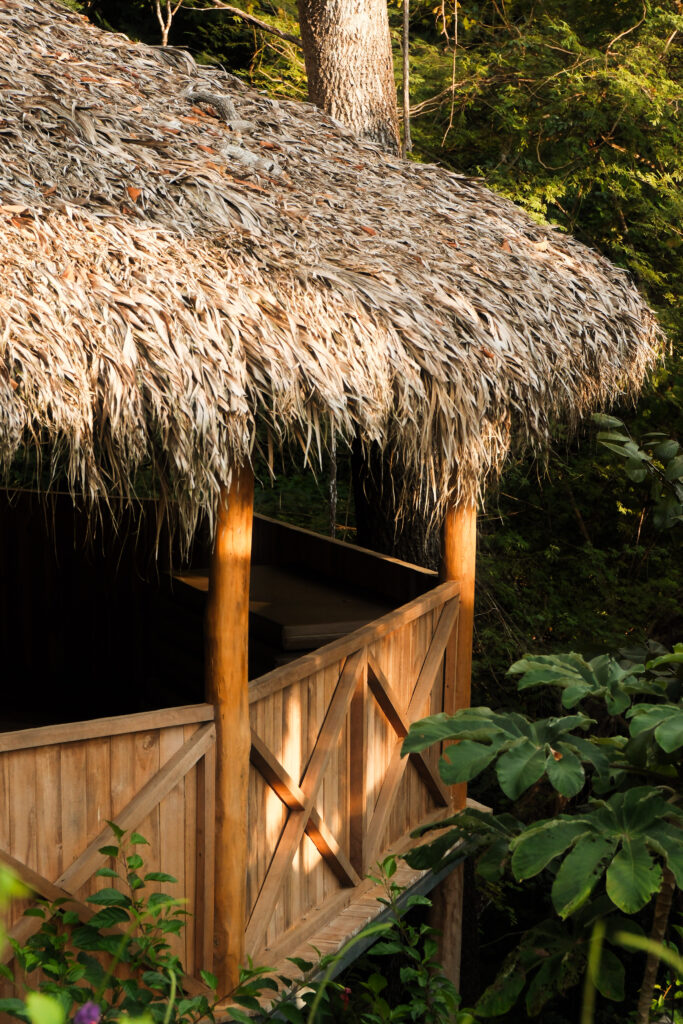Both approaches offer profound healing potential. Discover which path honors your unique needs.
As the psychedelic renaissance continues to unfold, more people are discovering the profound healing potential of these powerful medicines. Yet with increased accessibility comes an important question: What’s the difference between psychedelic therapy in a clinical setting and attending a plant medicine retreat? And perhaps more importantly, how do you know which path is right for you?
At Ananda Lodge, we deeply respect both approaches to healing. Clinical psychedelic therapy has brought legitimacy, research, and accessibility to these medicines in ways that are transforming mental healthcare. Meanwhile, plant medicine retreats honor ancient traditions, sacred ceremony, and the healing power of community and nature. Neither approach is inherently “better”, they simply serve different needs and offer distinct benefits.
Psychedelic therapy, often called psychedelic-assisted psychotherapy, represents a groundbreaking integration of psychedelic substances into conventional mental health treatment. In this model, substances like psilocybin, MDMA, or ketamine are administered in controlled clinical settings under the supervision of licensed mental health professionals.
The clinical approach typically unfolds in three distinct phases: preparation involves screening and establishing therapeutic rapport, the session occurs in a comfortable clinical space with trained therapists present, and integration follows through ongoing therapy sessions.
A key distinction: Most clinical psychedelic therapy utilizes synthetic or pharmaceutical-grade compounds produced in laboratories. They’re created in controlled pharmaceutical settings rather than derived directly from plants. This standardization allows for precise dosing and meets medical regulations.
Research from Johns Hopkins and Imperial College London has demonstrated remarkable efficacy for treatment-resistant depression, PTSD, end-of-life anxiety, and addiction.

A 30-minute conversation with our team to explore if a plant medicine retreat is better suited for your journey.
For individuals with complex medical histories or psychiatric conditions, the clinical setting provides crucial medical supervision. Trained professionals monitor vital signs, address adverse reactions, and ensure physical safety throughout the experience.
Clinical trials focus on treating specific conditions, such as: major depressive disorder, PTSD, substance use disorders. If you have a clear diagnosis and are seeking symptom relief, the clinical model offers evidence-based protocols tailored to your condition.
In regions where psychedelic therapy is legal, treatment may eventually be covered by insurance. The legal structure provides clear protections and standardized care protocols.
Psychedelic therapy can complement your existing treatment, working alongside your psychiatrist or therapist. The clinical model facilitates communication between providers and coordinated care.
Clinical sessions typically last several hours, with patients returning home the same day, making treatment accessible for those who cannot take extended time away from responsibilities.

Plant medicine retreats offer a distinctly different paradigm. One rooted in indigenous wisdom, sacred ceremony, and holistic healing. Rather than treating isolated symptoms, retreats address the whole person within the context of community, nature, and spiritual connection.
At centers like Ananda Lodge, retreats typically span several days to a week or more, creating an immersive healing container. This extended timeframe allows for multiple ceremonies, integration practices, and the profound transformation that unfolds when you step completely away from your daily life.
Unlike the synthetic compounds used in most clinical settings, plant medicine retreats work with natural, earth-based medicines in their traditional forms, such as ayahuasca brewed from the vine and chacruna leaf, whole psilocybin mushrooms, San Pedro cactus, and other sacred plants. These medicines contain not just single isolated compounds, but complex botanical profiles with multiple alkaloids and compounds that work synergistically. Many traditions hold that the spirit or consciousness of the plant itself is part of the healing, viewing these medicines as living teachers rather than mere chemical tools.
The ceremonial approach honors the intelligence of these plant medicines themselves. They’re viewed not merely as pharmaceutical compounds but as sacred allies with their own wisdom to offer. This perspective invites a relationship of respect, reciprocity, and reverence with the natural world.

One of the most distinctive aspects of retreat experiences is the healing that occurs in relationship with others. Unlike the private nature of clinical therapy, plant medicine ceremonies often occur in group settings where participants journey together.
This communal container offers profound benefits. You witness others’ courage in facing their shadows, which inspires your own vulnerability. Shared experiences create bonds that help you feel less alone in your struggles. The collective energy amplifies healing, as participants hold space for one another’s transformation.
Between ceremonies, communal meals, group integration circles, and shared moments in nature create ongoing opportunities for authentic connection. In our increasingly isolated world, healing in community addresses a deep hunger for genuine human connection.
– Jonathan, Past Psilocybin Immersion Guest
There’s something profoundly transformative about physically removing yourself from your everyday environment. When you arrive at a retreat center, you leave behind the familiar patterns, triggers, and responsibilities that may keep you locked in old ways of being.
This immersion creates space for genuine transformation. Away from work emails, family dynamics, and daily stressors, your nervous system can finally relax. Without constant demands, you have spaciousness to feel what you’ve maybe been too busy to feel, process what perhaps has been avoided, and envision new possibilities for your life.
The retreat setting also removes external cues that may trigger habitual behaviors. In a new environment, you’re free to try on new ways of being, experiment with different choices, and discover aspects of yourself that don’t emerge in your normal context.
Clinical sessions occur in offices designed for functionality. Plant medicine ceremonies, by contrast, occur in spaces intentionally crafted to honor the sacred nature of the work. Altars, candlelight, sacred music, and ritual elements create a container that communicates, this is holy work.
Ceremony itself is medicine. Rituals that mark the beginning and end of journeys help the psyche understand it’s entering and leaving an extraordinary state. Sacred songs may guide the journey and offer comfort. The presence of experienced facilitators who hold space with reverence creates an environment that allows an openness to what may unfold.
These ceremonial elements aren’t superficial additions, they’re integral to the process. Research on “set and setting” confirms that ritual context profoundly influences the quality and outcome of these profound experiences.
Unlike clinical sessions where you may return home hours after dosing, most retreats provide extended time for integration before you re-enter normal life. The days following ceremonies are intentionally unstructured. Time for rest, journaling, walking in nature, processing in community, or receiving bodywork.
This extended integration period allows insights to land and embody. Rather than immediately returning to triggering demands, you have space to practice new ways of being in a supported environment. Morning yoga, meditation sessions, integration circles, and one-on-one facilitator meetings help translate visionary experiences into practical wisdom.
While clinical therapy occurs indoors, plant medicine retreats immerse you in the natural world. Whether it’s the rainforest surrounding Ananda Lodge, the Amazonian jungle, or other sacred landscapes, nature itself becomes part of the healing.
Research consistently shows that time in nature reduces cortisol, lowers blood pressure, and improves mood. During plant medicine journeys, nature takes on heightened significance. The sound of birds becomes a symphony, and you viscerally feel your interconnection with all living things.
This reconnection with the natural world often becomes one of the most profound and lasting effects of retreat experiences, creating renewed environmental stewardship and recognition that healing ourselves and healing the planet are intimately connected.
Clinical psychedelic therapy typically involves one to three dosing sessions over several weeks. Plant medicine retreats often include multiple ceremonies over a period of consecutive days.
This repetition allows for depth that single sessions cannot provide. The first ceremony might clear surface material or break through initial resistance. The second builds on those openings, going deeper into core wounds. By the third or fourth ceremony, you’re working at profound levels, guided by cumulative insights from previous journeys.
Clinical therapy: Several hours per session, usually return home same day
Retreats: Multi-day immersive experiences (typically 4-10 days)
Clinical therapy: Office or medical facility in urban/suburban locations
Retreats: Natural settings such as rainforests, mountains, coastal areas
Clinical therapy: Typically one-on-one with therapist(s)
Retreats: Often group ceremonies with community support
Clinical therapy: Medical model focused on symptom reduction
Retreats: Holistic model focused on transformation, spiritual connection, and wholeness
Clinical therapy: Follow-up therapy sessions with same provider
Retreats: Group integration circles, facilitator check-ins on-site and personalized support after you return home, online community support

A 30-minute conversation with our team to explore if our offerings are in alignment with your journey.
Both pathways offer profound healing, but certain situations may make one approach more suitable than the other.
● Individuals with complex medical conditions requiring ongoing monitoring
● Those seeking treatment for a specific diagnosed condition with established protocols
● People who prefer a medical framework and one-on-one therapeutic relationship
● Individuals who cannot take extended time away from work or family obligations
● Those seeking holistic transformation beyond symptom relief
● Individuals drawn to spiritual or ceremonial approaches to healing
● People who value healing in community and shared experiences
● Those able to take time away for immersive experiences
● Individuals seeking connection with ancient wisdom traditions
● Those drawn to working with natural plant medicines in their traditional forms
● Individuals seeking to combine healing with time in nature
– Amanda, First Responders Psilocybin Immersion Guest
Whether you choose clinical therapy, a plant medicine retreat, or perhaps both at different times in your journey, what matters most is making an informed, intentional decision that honors your unique needs and inner guidance.
● What am I seeking? Symptom relief, personal growth, spiritual connection, or all three?
● What’s my relationship with medical/clinical settings?
● Do I have the time and resources for an immersive retreat experience?
● Am I drawn to working one-on-one or in community?
● What role does nature and sacred ceremony play in my healing?
● Are there medical factors that require clinical supervision?
● What does my intuition say about each approach?
There’s no wrong answer. Your healing journey is uniquely yours, and the path that calls to you is the right path for this moment.

At Ananda Lodge, we bridge the sacred wisdom of plant medicine traditions with contemporary care. Our approach honors earth-based medicines within a framework of trauma-informed somatic care, bringing together the best of both worlds.
Your journey begins well before you arrive. Through thorough intake assessments, one-on-one sessions, and personalized guidance, we ensure plant medicine is appropriate for your unique situation. We screen for medical contraindications, discuss your intentions, and provide education about what to expect, so you feel empowered and ready. Our trauma-informed preparation acknowledges that safety is established through transparency, consent, and autonomy. You’ll know exactly what you’re saying yes to.
We intentionally limit our retreats to a maximum of 8 participants, ensuring each person receives individualized attention throughout their journey. This intimate container allows our facilitators and medicine carriers to attune to your specific needs. Between ceremonies, we offer somatic practices, gentle yoga, art therapy classes and one-on-one sessions that help you stay present with whatever arises. The small group size creates safety for vulnerability while fostering genuine community connection.
The medicine experience is only a portion of your journey. We provide structured integration support during your retreat through daily group circles and individual processing sessions with a dedicated care team member. After you return home, we offer continued support for 3 months, through follow-up calls, email support including comprehensive resources and guidebooks, and group integration calls.
Understanding that trauma lives in the body, not just the mind, we integrate somatic approaches throughout your journey. Our facilitators are trained to recognize trauma responses and support nervous system regulation through grounding techniques, breathwork, and gentle touch (with explicit consent). We honor that healing happens at the body’s pace, never rushing or forcing process. This ensures that plant medicine experiences support genuine integration rather than retraumatization.
The path you choose matters less than choosing consciously. At Ananda Lodge, we hold space for those called to earth-based medicine within a container of modern care, honoring ancient wisdom while meeting contemporary standards of safety and support.
This work requires courage, but you don’t have to walk this path alone. Our team of experienced medicine carriers and trauma-informed facilitators are here to support your transformation from first consultation through post-retreat integration.